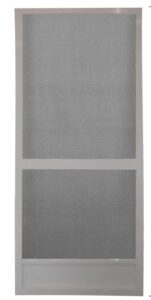
Screen doors are a ubiquitous feature in homes around the world, serving as a versatile and practical addition to any entrance. They combine functionality with aesthetic appeal, allowing homeowners to enjoy fresh air and natural light while keeping insects and debris at bay. This comprehensive guide delves into the various types of screen doors, their benefits, and tips for selecting and maintaining the perfect screen door for your home.
Types of Screen Doors
Screen doors come in a variety of styles, each suited to different needs and preferences.
1. Hinged Screen Doors
Hinged screen doors are the most common type, typically mounted on hinges and installed in front of an exterior door. They can swing open either inward or outward and are often used on front doors, back doors, and side entrances. These doors are known for their durability and ease of use, providing a straightforward way to ventilate a home while maintaining security.
2. Sliding Screen Doors
Sliding screen doors are commonly used for patio and deck entrances. This type of screen door is ideal for spaces where a swinging door might take up too much space. Sliding screen doors are particularly popular for their sleek design and ability to blend seamlessly with modern home aesthetics.
3. Retractable Screen Doors
Retractable screen doors offer a versatile solution for homeowners who want the option of having a screen door without the permanent presence of one. These doors roll up into a compact housing when not in use, making them virtually invisible.
4. Magnetic Screen Doors
They are typically made of lightweight mesh and are easy to install. Magnetic screen doors are ideal for high-traffic areas and homes with pets or children, providing a hands-free way to keep bugs out while allowing easy access.
Benefits of Screen Doors
Screen doors offer a multitude of benefits that enhance the comfort, security, and energy efficiency of a home. Here are some of the key advantages:
1. Improved Ventilation and Airflow
One of the primary benefits of screen doors is their ability to improve ventilation and airflow within a home. By allowing fresh air to circulate while keeping insects and debris out, screen doors help maintain a comfortable indoor environment.
2. Natural Light
Screen doors enable natural light to enter a home, brightening interior spaces and creating a more inviting atmosphere. Natural light has been shown to have numerous health benefits, including improving mood and productivity. By incorporating screen doors, homeowners can take advantage of these benefits without compromising on security or privacy.
3. Pest Control
Insect infestations can be a significant nuisance, particularly during the warmer months. Screen doors act as a barrier against flies, mosquitoes, and other pests, allowing homeowners to enjoy the outdoors without the annoyance of bugs. This is especially important for homes in regions with high insect activity.
4. Enhanced Security
Many screen doors are designed with added security features, such as reinforced frames, heavy-duty mesh, and secure locking mechanisms. These features provide an extra layer of protection against intruders, making it more difficult for them to gain access to a home. Some screen doors are even designed to withstand strong impacts, adding to their security benefits.
5. Energy Efficiency
Screen doors contribute to energy efficiency by allowing for natural ventilation and reducing the need for artificial cooling. During cooler months, they can also be used to keep warm air inside while allowing sunlight to enter, helping to reduce heating costs.
Choosing the Right Screen Door
Selecting the right screen door involves considering several factors, including the specific needs of your home, the door’s location, and your personal preferences. Here are some tips to help you make the best choice:
1. Consider the Door’s Location
The location of the screen door will influence the type of door you choose. Consider the space available and how the door will be used when making your decision.
2. Evaluate Material and Durability
Screen doors are made from various materials, including aluminum, steel, and wood. Aluminum and steel doors are known for their durability and resistance to rust, making them ideal for outdoor use. Wooden screen doors offer a classic look and can be painted or stained to match the home’s exterior.
3. Check the Mesh Type
The type of mesh used in a screen door can affect its performance. Standard fiberglass mesh is durable and affordable, while pet-resistant mesh is designed to withstand scratching and tearing.
4. Look for Security Features
If security is a concern, look for screen doors with reinforced frames, heavy-duty mesh, and secure locking mechanisms. Some screen doors are designed with multiple locking points for added security.
5. Ease of Installation and Maintenance
Choose a screen door that is easy to install and maintain. Some doors come with DIY installation kits, while others may require professional installation. Consider the door’s maintenance requirements, such as cleaning the mesh and lubricating the hinges, to ensure it remains in good condition.
Conclusion
Screen doors are a valuable addition to any home, offering a range of benefits from improved ventilation and natural light to enhanced security and energy efficiency. By understanding the different types of screen doors and considering factors such as location, material, and maintenance, homeowners can choose the perfect screen door to meet their needs. With proper care and maintenance, a quality screen door can provide years of comfort and functionality, making it a worthwhile investment for any household.

